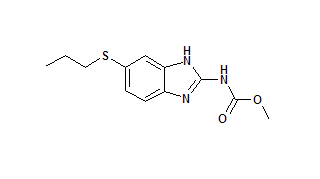We have reported previously the efficacy of antiprotozoal drugs against canine giardiasis (In press, Journal of Veterinary Clinic, the Korean Society of Veterinary Clinics). Fenbendazole was found to be the most efficacious for the treatment of canine giardiasis. There were no significant differences between the efficacy of albendazole and fenbendazole against canine giardiasis. On the other hand, the efficacy of metronidazole for the treatment of canine giardiasis, the efficacy was lower when compared to that of albendazole and fenbendazole. On the basis of these results, to evaluate clinical effect of silymarin, we evaluated the therapeutic efficacy of metronidazole alone, or combined with silymarin for 2 weeks for canine giardiasis. In addition, to observe effects on nutrition, we investigated the changes of body weight, the serum biochemical indicators for liver inflammation (GOT, GPT, NH3), the liver cell regeneration indicators (total protein, albumin) and the hematological changes during treatment (WBC, RBC, MCV, MCH and MCHC). The dogs were allocated to four groups; one group was treated with silymarin (3.5 mg/kg once a day, oral), another with metronidazole (50 mg/kg once a day, oral), and the other group with silymarin (3.5 mg/kg once a day, oral) plus metronidazole (50 mg/kg once a day, oral), while control group remained nontreated. The fecal samples from all the dogs were examined, using the ZSCT and giardia antigen test kit (SNAP(*) Giardia, IDEXX Laboratories), from each dog of each group for three times a week for 2 weeks. Dogs were considered to have giardiasis when one or more of the fecal samples had positive results for Giardia cysts. Seven days after treatment, the efficacy of silymarin plus metronidazole was found 79%, whereas that of metronidazole was 72%. Ten days post-treatment the efficacy of metronidazole plus silymarin (91%) was significantly different in comparison with that of metronidazole (75%). Two weeks post-treatment no cysts were detected in the fecal samples in the dogs of metronidazole or silymarin plus metronidazole-treated groups. Whereas, the fecal samples of all the dogs of the control and only silymarin-treated groups were giardia positive. Signs of side effects were not observed in silymarin plus metronidazole-treated dogs. But poor appetite and intermittent vomiting signs were observed in two dogs of the metronidazole-treated group that resolved when metronidazole administration was discontinued. The body weight of those treated with metronidazole was significantly decreased in comparison with those treated with silymarin and metronidazole plus silymarin. There were significant differences of body weight between the dogs treated with silymarin and metronidazole. Two weeks after metronidazole treatment, serum concentration of GOT, GPT and NH3 were significantly increased in comparison with those treated with silymarin. On the other hand, the serum concentration of GOT, GPT and NH3 were not significantly increased when treated with silymarin plus metronidazole compared to those treated with metronidazole. Serum total protein and albumin concentrations were decreased after metronidazole treatment as compared to those treated with silymarin and silymarin plus metronidazole. The concentrations of serum total protein and albumin decreased significantly in metronidazole-treated group as compared to that of treated with silymarin. The numbers of WBC and RBC did show significant differences in the dogs treated with metronidazole, while MCV, MCH were significant by different between silymarin and metronidazole-treated dogs. On the other hand, there were no significant differences in MCHC in any groups. These data suggest that silymarin, in supplement with antiprotozoal drugs, can influence the therapy of canine giardiasis.
COPYRIGHT 2005 Thorne Research Inc.
COPYRIGHT 2005 Gale Group



